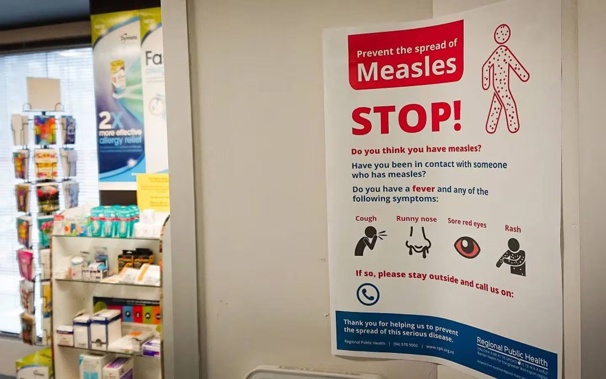
By RNZ
There is a measles alert for two flights to Melbourne last week, with Kiwis who were on the flights asked to stay home until they have called Healthline for advice.
Te Whatu Ora/Health NZ said the flights to Melbourne were Emirates flight EK408 from Dubai on February 14 and Singapore Airlines flight SQ217 from Singapore on February 19.
Australian health authorities had told Health NZ that people in New Zealand were on those flights, along with confirmed measles cases.
“We are asking anyone who travelled on those flights to contact Healthline immediately and to stay home until they receive advice from public health services. Contacts may already be developing symptoms of measles so it is important to contact Healthline urgently,” Health NZ said.
“If they do need to seek healthcare, they should phone ahead and wear a mask.”
Thirteen travellers who were on the flights, then came to New Zealand, had been identified so far, the health authority said.
They were being followed up with contact tracing.
Health NZ said anyone who was on either of the two flights to Melbourne and who was not immune could be at “high risk of developing and spreading measles”.
People are considered immune if they have had two doses of the measles, mumps and rubella (MMR) vaccine, or lived in New Zealand before 1969.
Public health doctors have previously warned a measles outbreak was almost inevitable in New Zealand this year, because there were too many people not immunised.
/cloudfront-ap-southeast-2.images.arcpublishing.com/nzme/QVTZTL2L7VEX7CX6RZIPHZUWLA.jpg)
A poster at a medical centre warns against the spread of measles. Photo / Rob Dixon, RNZ
Health Minister Shane Reti also said he was “increasingly anxious” about the risk of an outbreak, especially given climbing case numbers overseas.
World Health Organisation figures showed there was a 45-fold increase in case numbers in Europe last year - some 42,200 people were infected, compared to 941 in 2022.
In 2019, a measles outbreak killed 83 people in Samoa. The vast majority of those were children.
New Zealand had been very lucky in the 2019 outbreak not to have a death, Reti said.
“But we did export it to Samoa and they had at least 80 people actually die. We need to remember that this is a condition that kills people. This is not a trivial condition.
“People - particularly the vulnerable, particularly the young - succumb to measles.”
Symptoms of measles include a fever, cough, runny nose, sore red eyes, and a rash beginning on the face and gradually spreading down the body to the arms and legs.
People who were on the flights were asked to check their immunisation records so they could share them with public health services.
They could do so either by logging onto My Health Record via https://my.health.nz/ or by contacting their local healthcare provider, Health NZ said.
My Health Record stores immunisation records from the year 2005 onwards.
National Public Health Service national clinical director Dr Susan Jack said it was safe for most people to be immunised again if they were unsure how many doses of MMR they had received.
“It is especially important if you are travelling overseas to ensure you are up to date with your immunisations.
“New Zealand is at high risk of a measles outbreak so it is important we all do our bit to prevent the spread of measles in our communities and to protect those at higher risk of severe illness. This means ensuring we are vaccinated, being aware of symptoms, and seeking advice if these develop.”
Anyone with any questions about measles, or who was unsure if they were affected, was encouraged to call Healthline on 0800 611 116.
- RNZ
Take your Radio, Podcasts and Music with you









